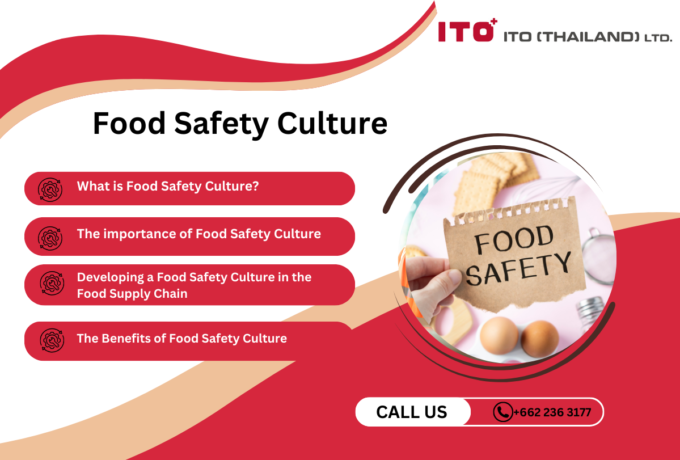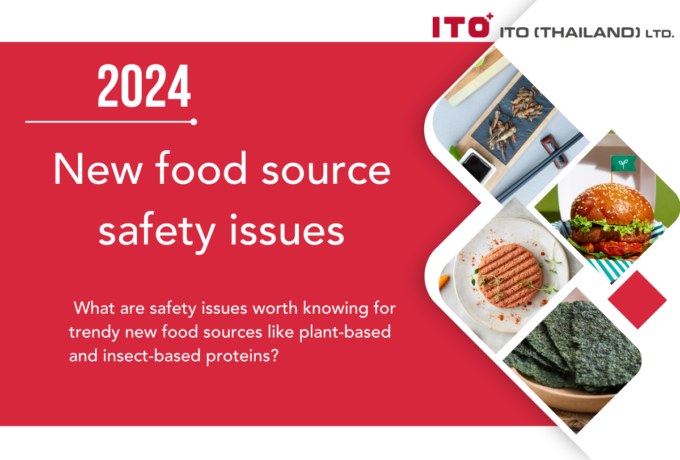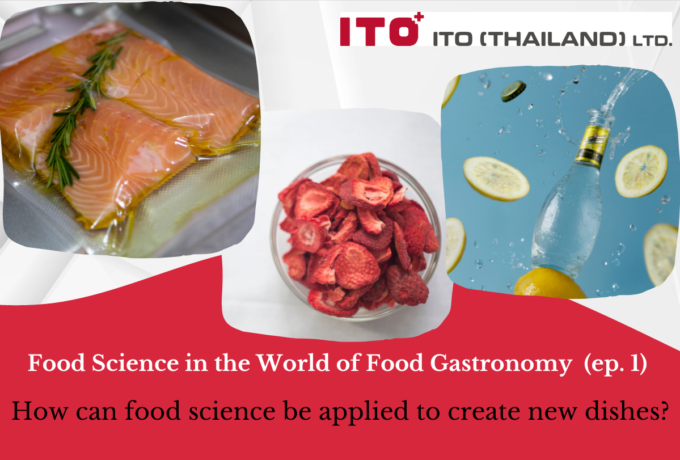ITO Thailand Hygiene Blog
Food Safety Aspects of Artificial Sweeteners
What are Artificial Sweeteners?
Artificial sweeteners, also known as sugar substitutes, non-nutritive sweeteners, or high-intensity sweeteners, are artificially produced compounds utilised in place of sucrose (table sugar) to add sweetness to food and drinks. Due to their significantly higher sweetness than regular sugar, only a fraction of artificial sweeteners (200 to 20,000 times less) is required to achieve an equivalent level of sweetness. Since the caloric contribution of these sweeteners, when used in such small quantities, is insignificant, they are often referred to as non-nutritive (4).
As of now, only six artificial sweeteners have been approved as food additives by the United States Food and Drug Administration (USFDA), including, Aspartame, Acesulfame-K (Acesulfame potassium), Saccharin, Sucralose, Neotame, and Advantame. Moreover, two additional sweeteners can be used as ‘Generally Recognised as Safe’ (GRAS), including certain Steviol Glycosides and Monk Fruit (2).
Benefits of Artificial Sweeteners
There are several benefits of artificial sweeteners (3), such as
•Beneficial option for individuals with diabetes – as artificial sweeteners provide a valuable solution for people with diabetes who desire sweet flavours. Artificially sweetened beverages offer a convenient alternative for individuals who regularly consume soft drinks and wish to reduce their sugar intake.
•Artificial sweeteners are made from natural sources (e.g., Stevia) – their significantly higher sweetness makes them an appealing choice for individuals concerned about weight, diagnosed with diabetes, or having other medical requirements. This is due to their nearly negligible calorie content.
•Lessen calorie consumption – when most artificial sweeteners contain zero calories, they do not contribute to the risk of exceeding calorie intake.
•Convenient – they are suitable for use in various products such as candies, baked goods, jams, jellies, dairy items, and carbonated beverages, particularly in baking, canning, and packaging.
•Enhancing oral health – excessive sugar consumption often leads to tooth decay. Sugar accumulation on teeth is associated with promoting bacterial growth and resulting in oral health issues. Unlike sugar, artificial sweeteners do not interact with oral bacteria and thus do not produce acids or contribute to tooth decay.
Disadvantages of Artificial Sweeteners
However, the disadvantages of artificial sweeteners are presented as discussed by Regoli (5), namely
•Undesirable aftertaste – while certain artificial sweeteners can enhance the taste of food and beverages, others can leave behind a sour aftertaste when consumed. This aftertaste can be distinctly unpleasant for certain people, which may require either using a combination of artificial sweeteners or opting for alternative products to achieve desired taste and calorie goals.
•Opting for artificial sweeteners means substituting sugars with chemical compounds (Stevia is excluded) – the sugar found in products containing artificial sweeteners is chemically derived rather than a natural substance. Some experts suggest that this poses an elevated risk of diseases, including cancer, and could potentially lead to neurological issues or increased cholesterol levels by altering the liver’s ability to process fats. Numerous studies indicate that regular consumption of artificial sweeteners can also intensify cravings for other sweet foods.
•Potential Weight Gains – even though artificial sweeteners contain no calories, they can lead individuals to associate sweetness with the number of calories consumed daily. Consuming artificial sweeteners can stimulate cravings for other sweet foods. When the body is not receiving sufficient nutrients, it may continuously seek more food, resulting in solid desires for high-calorie, sugary items. Aspartame, acesulfame-K, and saccharin have been linked to increased food consumption, with aspartame having the most potent effect on appetite. Artificial sweeteners can create cravings for sweetened foods, and reducing dependence on sugar or artificial sweeteners is recommended (6).
Potential Long-term Health Effects (6)
Impact on Gut Health – while not absorbed by the body, non-caloric artificial sweeteners can still affect the gut microbiota (microorganisms in the human gastrointestinal tract), potentially leading to metabolic syndrome. In a study with mice, saccharin, sucralose, or aspartame consumption resulted in glucose intolerance due to changes in gut microbiota caused by saccharin.
Cancer – early animal studies suggested a link between cyclamate, saccharin combination, and cancer. However, FDA studies found no association between these artificial sweeteners and human cancer. Other FDA-approved sweeteners also showed no evidence of a connection to various types of cancer.
Diabetes – non-nutritive sweeteners have minimal calories and require only a tiny amount of sweetness. However, excessive consumption of foods with artificial sweeteners can impact glucose metabolism, leading to weight gain and health complications like type 2 diabetes.
Headaches – some individuals may experience headaches triggered by aspartame or sucralose. Prolonged use of sweeteners in diet beverages appears to have a more vital link to migraines.
It is important to note that sugar and natural sweeteners contribute to various health issues, such as hypertension, inflammation, type 2 diabetes, and much more (1). Artificial sweeteners are also linked to harmful health effects, as mentioned above. Consumers must consider their intake carefully, and the public health sectors should also aim to promote nutrition literacy as well.
References
1.Harvard Health Publishing. (2022). The sweet danger of sugar. Retrieved June 27, 2023, from https://www.health.harvard.edu/heart-health/the-sweet-danger-of-sugar
2.Harvard School of Public Health. (2023). Low-Calorie Sweeteners. Retrieved June 27, 2023, from https://www.hsph.harvard.edu/nutritionsource/healthy-drinks/artificial-sweeteners/
3.Jain, S. (2023). Pros and Cons of Artificial Sweeteners Explained. Retrieved June 27, 2023, from https://naturallyyours.in/blogs/blog/pros-and-cons-of-artificial-sweeteners-explained
4.National Cancer Institute. (2023). Artificial Sweeteners and Cancer. Retrieved June 27, 2023, from https://www.cancer.gov/about-cancer/causes-prevention/risk/diet/artificial-sweeteners-fact-sheet#what-are-artificial-sweeteners
5.Regoli, N. (2019). 18 Advantages and Disadvantages of Artificial Sweeteners. Retrieved June 27, 2023, from https://connectusfund.org/7-advantages-and-disadvantages-of-artificial-sweeteners
6.Schiller, R. (2021). The Pros and Cons of Artificial Sweeteners. Retrieved June 27, 2023, from https://www.verywellhealth.com/artificial-sweeteners-5184450
Related Post
-

Food Safety Culture
Food safety culture plays a crucial role in safeguarding the company's reputation, ensuring the well-being of its employees, and providing a safe experience for its customers.
-

New food source safety issues
What are safety issues worth knowing for trendy new food sources like plant-based and insect-based proteins?
-

British Retail Consortium (BRC) Standard
Food safety management systems play a vital role in ensuring the production and distribution of safe and high-quality food products to consumers. With the global food supply chain becoming increasingly complex, food businesses must implement effective systems prioritising safety, quality, and compliance with industry standards. A food safety management system encompasses a set of procedures, processes, and controls designed to identify, prevent, and manage potential hazards at every stage of the food production and supply process. This proactive approach not only safeguards consumers' health but also protects the reputation and credibility of food companies in an ever more competitive market.
-

Food Science in the World of Food Gastronomy (Part 1)
How can food science be applied to create new dishes?
-

FSSC 22000
Food manufacturers must ensure food safety standards and processes. FSSC 22000 is an official certification program for Food Safety Management Systems (FSMS) recognised by the Global Food Safety Initiative (GFSI). This certification scheme offers a set of guidelines and procedures to ensure uniformity, openness, and safety across your entire supply chain. It applies to all companies operating within the food and beverage industry, ranging from farmers to retailers. By fulfilling the necessary criteria and obtaining FSSC 22000 certification, it is demonstrated that the required standards for food quality and implementing effective processes to manage and mitigate risks associated with food fraud, foodborne illnesses, expensive recalls, and other external threats are met.
-

New food sources from under the sea
A new sustainable food source that is environmentally friendly and addresses resource scarcity issues, which is currently trendy! Let's get acquainted with the new food sources from the underwater world, such as seaweed and jellyfish.










